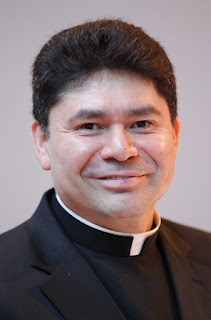Media were here early for this historic day, February 28. An
ABC producer even helped me find a cappuccino at North American College while
waiting for George Stephanopoulos to go up on the roof for his interview with
Cardinal Dolan.
Both voting cardinals and those over 80 left for the Vatican at 10:15 a.m. to say
goodbye to Pope Benedict. There’s both a prayerful and excited atmosphere here
at this historic moment. I viewed the meeting on CNN, which we have on all the
time. We started out looking at BBC but switched to CNN when one of its staffers
came in and expressed mock horror at our supposed viewing indiscretion.
CNN asked me to be on their morning program. The set was
scaffolding on Via Della Conciliazione. I asked a reporter what Soledad O’Brien would ask about and he said,
“Heck, it’s a morning show. No problem.” So as people were having coffee,
Soledad queried me on the sexual abuse crisis. Swallow that with your bagel. I
got a ride back to NAC with Christiana Amanpour, who was on her way to NAC to
interview Cardinal Dolan in the NAC courtyard.
CNN stayed to cover live our presser at 6:30 p.m. with
Cardinals Francis George of Chicago, Daniel DiNardo of Galveston-Houston and
Sean O’Malley of Boston. Topic was reaction to today’s meeting with the pope.
.About 50 media showed up, eight of them cameramen. There were some laughs.
When asked how their lives would change when the pope officially resigned at 8
p.m., Cardinal George opined that given the possibilities, seminarians might
look at him with more respect than he gets now. Asked who they would recommend
to be next pope, Cardinal DiNardo trying to dodge the question, saying, “Cardinal
O’Malley” as he passed him the microphone.
Don Clemmer of our media relations office is capturing on
camera some behind-the-scene moments. We’re posting them on our Facebook page
at www.Facebook.com/USCCB. In one, you feel like you can hear
Cardinal Dolan smile.
We’ve increased Spanish-language services, an effort that Mar
Munoz-Visoso is spearheading here. Cardinal O’Malley and Cardinal McCarrick,
who are fluent in Spanish, are invaluable in this effort.
We’ll be without power for two hours tomorrow morning, as
the college changes from one transformer to another. No lights, no power for
the routers, no elevators. I hope that the sun will be bright for our morning
meeting with communication directors.
I did get some time to think while waiting an hour for my
one-minute CNN moment. I asked for a chair in the sun while I waited and
enjoyed a light breeze. It was a perfect Roman experience, reminding me, as
Robert Browning wrote, that “God’s in His heaven – All’s right with the world!”
--
Sister Mary Ann Walsh is media relations director for the USCCB.
--
Sister Mary Ann Walsh is media relations director for the USCCB.






